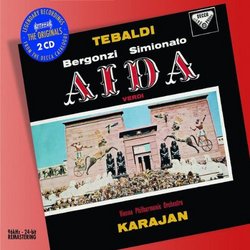| All Artists: Verdi, Tebaldi, Vpo, Karajan Title: Verdi: Aida Members Wishing: 0 Total Copies: 0 Label: Decca Original Release Date: 1/1/2007 Re-Release Date: 5/8/2007 Genre: Classical Styles: Opera & Classical Vocal, Historical Periods, Modern, 20th, & 21st Century Number of Discs: 2 SwapaCD Credits: 2 UPC: 028947582403 |
Search - Verdi, Tebaldi, Vpo :: Verdi: Aida
 | Verdi, Tebaldi, Vpo Verdi: Aida Genre: Classical
|
Larger Image |
CD Details |
CD ReviewsThe Reference Aida The Cultural Observer | 05/26/2007 (5 out of 5 stars) "Spinto voices are an almost extinct breed in today's operatic world. The only spinto voice will the required thrust, power, squillo, and timbre today would probably belong to that of Aprile Millo, whose several Verdi recordings display her excellent musicianship and impressive vocal qualities. Throughout the course of modern operatic recording history, only five true Aidas have been captured in the recording studio. They are Zinka Milanov, Renata Tebaldi, Leontyne Price, Maria Callas, and Aprile Millo. All other Aidas such as Freni, Ricciarelli, Montserrat Caballe, Gwyneth Jones, Birgit Nilsson, Margaret Price, Maria Chiara, and the whole lot of them are either dramatic (Wagnerian) sopranos or lyric sopranos who do not satisfy all the requirements of this Verdian role. Dramatic sopranos like Gwyneth Jones and Birgit Nilsson are certainly more than able to handle all the requirements of the music, but they lack an Italianate sound which while not necessary, make the role all the more endearing. I love Gwyneth Jones in Aida, but she will definitely not compare with Tebaldi or Price in the role, as magnificent as she is in Strauss, Wagner, and Puccini. Lyric sopranos on the other hand, almost die when they try to sing the demands of this Verdian grand opera role. It is not that they cannot sing the notes--lyrics can, but they do not have the squillo of spintos. Unfortunately, with a vocal music education predominated by Mozart and Handelian singing, these golden age singers are rapidly disappearing, and we must turn to the past for great recordings of just about anything except period music.
This recording of Aida is simply put, the best on disc. The conducting, the orchestra, and the singers make this musical experience very special, and it helps that Karajan was in a very romantic-intimate mood while conducting this performance of Aida. With the Wiener Philharmoniker, he produces some of the most intricately detailed orchestral sounds seldom heard in interpretations of Verdi's score. I dare say that although his conducting is not idiomatically Italian, if it is not like Serafin's or Muti's, he perhaps makes the most out of this score and produces a most exciting performance. Renata Tebaldi is nothing short of amazing in the title role. Although her voice was fresher in the first recording with Decca, it did not change much to make any Aida moments sound difficult for her. Also, her interpretation of the role deepened (perhaps Callas influenced her), so what we get is a more intimate and exciting portrayal of the Ethiopian princess. With her golden voice and that perfect squillo, Tebaldi is perhaps the best exponent of this role. Her Radames is Carlos Bergonzi, and even if he did not have the thrilling power that Franco Corelli gave to the role, he certainly had the best Verdian style of all the tenors who sang the role. There are some moments where one would wish that he would cry his heart out or sob like Corelli did, but Bergonzi is in a class of his own. It is a different, more noble, more controlled Radames than Corelli or Domingo, and I would say that I far prefer him to Domingo. Simionato is simply amazing as Amneris. Everything that this mezzo touches spits fire and blood across the stage, and her ability to color her voice at will makes her Amneris a benchmark upon which others will be judged. She is the best Amneris of the three Italian greats--that is, Barbieri, Cossotto, and herself. Brava! Cornell Mac'Neill was the leading Verdian baritone of the 50's, and his performance in this recording shows why he was sought after in the role of Aida's father. The soloists in this recording perform with a romantic intimacy that is almost absent from the many Aidas on the market, and this is why I would recommend this recording to anyone who would want to discover Aida's music." |

 Track Listings (18) - Disc #1
Track Listings (18) - Disc #1